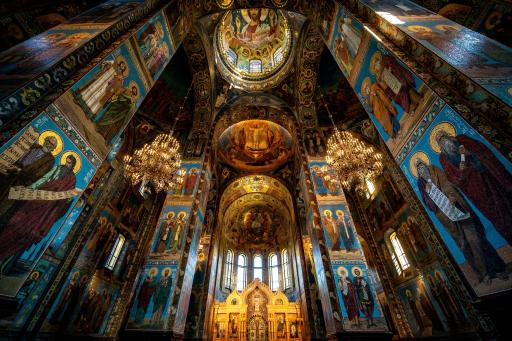- The Hesychast
- Posts
- Saints Constantine and Helen – Equals to the Apostles
Saints Constantine and Helen – Equals to the Apostles
Receive Honest News Today
Join over 4 million Americans who start their day with 1440 – your daily digest for unbiased, fact-centric news. From politics to sports, we cover it all by analyzing over 100 sources. Our concise, 5-minute read lands in your inbox each morning at no cost. Experience news without the noise; let 1440 help you make up your own mind. Sign up now and invite your friends and family to be part of the informed.

Saints Constantine and Helen are commemorated together as “Equal-to-the-Apostles” on May 21. The Church calls Emperor Constantine (306–337) “the Equal of the Apostles” for his pivotal role in advancing the faith, and honors his mother, Saint Helen, in the same way.

Icon of Saints Constantine and Helen, Equal-to-the-Apostles, Holding the Holy Cross
Constantine was born around 274 as the son of Emperor Constantius Chlorus and Helen, a Christian of humble. When Constantius died in 306, the army proclaimed Constantine emperor in Britain and Gaul. Deeply impressed by his Christian mother, he honored Helen with the title. As a young ruler Constantine had a famous vision before battle: he prayed for help, and “the Lord showed him a radiant sign of the Cross in the heavens with the inscription ‘In this Sign, conquer’”.

“In this sign, conquer” — ΕΝ ΤΟΥΤΩ ΝΙΚΑ
With the Cross on his banners, he won victory at the Milvian Bridge (312), which he credited to Christ. These events marked the turning point of history: Constantine became sole ruler of the West and embraced Christianity as the guiding faith of the empire.
Their Contributions to the Church and Faith
Constantine’s reign brought dramatic freedoms and reforms for the Church. In 313 he and Emperor Licinius issued the Edict of Milan, granting religious liberty throughout the . Persecutions ceased, prisoners were released, and Christians could worship openly. As Emperor he even “instituted Sunday as a day of public worship”, underscoring its Christian significance.

Icon of the First Ecumenical Council
He then took up the role of a Christian leader: in 325 he convened the First Ecumenical Council at Nicaea (in Bithynia) to address the Arian heresy. There, 318 bishops (including St. Athanasius and St. Nicholas) affirmed the divinity of Christ in the Nicene Creed (inserting “consubstantial with the Father”).
After Nicea, Constantine continued to support the Church with building projects and charity. He founded or enlarged great basilicas – for example, his city’s Church of the Holy Apostles (planned as a mausoleum for Christian relics) and the church of Hagia Irene – and he endowed other Christian.
According to Fr. Stavros Akrotirianakis, he “built magnificent churches, such as St. Irene’s in Constantinople, and the Church of the Holy Apostles”. Meanwhile Constantine transferred the imperial capital from pagan Rome to Byzantium (renamed Constantinople), hoping that Christ’s Cross would now guard the great city. In all these efforts, he demonstrated the vision that only Christianity could unite the many peoples of the empire.

Icon of Saint Helen, Equal-to-the-Apostles
Saint Helen’s achievements are closely entwined with her son’s. In 326, with Constantine’s blessing and funds, the pious Empress Helen journeyed to the Holy Land to venerate Christ’s life. There, with Patriarch Macarius, “through the will of God, the Life-Creating Cross was miraculously discovered” (the True Cross upon which Jesus was crucified).

Icon of Saints Constantine and Helen, Equal-to-the-Apostles
After this finding, “Saint Helen, in her zeal to glorify Christ, erected churches in Jerusalem at the site of the Crucifixion and Resurrection, in Bethlehem at the cave where the Saviour was born, and another on the Mount of Olives”. She also endowed the Church of the Resurrection (Holy Sepulchre) and the Church of the Nativity.
Helen was known for her charity: she distributed generous alms and even served the poor herself during her. After years of prayer and works of love, she returned to Constantinople and reposed around 328–330 AD. “Because of her great services to the Church,” the holy Empress Helen also “is called ‘the Equal of the Apostles’”. In both mother and son, the empire saw a new era of Christian faith and devotion.
Liturgical Hymns for Their Feast
This hymn honors Constantine as God’s chosen emperor (“Your Apostle among kings”) and asks Christ to keep his city (Constantinople) safe. The Kontakion (Tone 3) for the feast echoes Helen’s role with these words:

The Kontakion calls the Cross “precious” and “the weapon of the faithful,” celebrating how Constantine and Helen brought the Cross into the light for all to venerate. These hymns, together with the Synaxarion verse, reflect Church tradition: as one liturgical text puts it, on May 21 we commemorate “the holy, glorious, God-crowned and great sovereigns Constantine and Helen, the Equals to the Apostles”. In its fullness, the Church worships God for their deeds and the blessing He gave them.
A Spiritual Reflection for Today
On this Name Day, Orthodox Christians – especially those named Constantine or Helen – rejoice in their heavenly patrons. Their story challenges us to put Christ first in every endeavor. Just as Constantine entrusted the safety of his city to God’s, so we are called to give our lives to Christ’s care and not worldly power.
Just as Helen humbly sought the Cross and built churches over holy, so we ought to seek Christ in prayer and to build up His Church through love and service. This feast reminds us that even those of royal rank (like Constantine) and humble origins (like Helen) can become saints by faith. We too can bear their banner by carrying the Cross daily in our hearts.
On May 21 the whole Church lifts up the Cross and our sovereign saints with joy. We might celebrate with a festive meal, give alms or engage in extra prayer, knowing that Saint Constantine and Saint Helen pray for us. May their intercessions and example inspire us: to be courageous in confessing Christ, to honor parents and elders as did Constantine and Helen, and to show charity to the poor. In their words at his baptism, Constantine said he longed “to obtain the salvation of God” – may this Name Day renew in all of us that same earnest desire for the Kingdom of God.
Impending Doom
The Pour Over believes the news can be a force for good, helping people find rest and comfort in Christ while spurring them on to action.
Instead of, you know… creating division and a feeling of impending doom.
Join 1 million+ Christians who receive TPO’s politically-neutral, anger-and-anxiety-free, Christ-first news coverage.






Reply